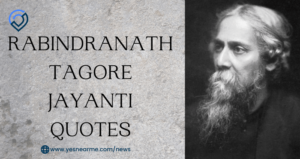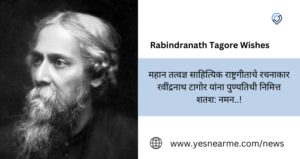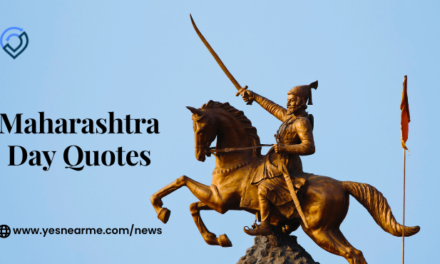Rabindranath Tagore Wishes was born on 7 May 1861 in the Jorasanko Mansion in Calcutta. He nicknamed Rabi. His father was Debendranath Tagore, and his mother was Sarada Devi.
Studied at the University of Calcutta and College London. He’s a Poet, Short story writer, novelist, essayist, and painter.
He was certainly a man of many talents. His contribution to literature, arts, music, and politics is brilliant.
Rabindranath Tagore died on 7 August 1941 in Calcutta.
Rabindranath Tagore
Wishes In English
- Clouds come floating into my life, no longer to carry rain or usher storm but to add color to my sunset sky.
- You can’t cross the sea merely by standing and staring at the water
- I slept and dreamt that life was a joy. I awoke and saw that life was service. I acted and behold, service was a joy.
- It is very simple to be happy, but it is very difficult to be simple.
- The butterfly counts not months but moments and has time enough.
- The small wisdom is like water in a glass:
clear, transparent, and pure.
Great wisdom is like the water in the sea:
dark, mysterious, impenetrable.
- Reach high, for stars lie hidden in you. Dream deep, for every dream, precedes the goal.
- Don’t limit a child to your own learning, for she was born at another time.
- Death is not extinguishing the light; it is only putting out the lamp because the dawn has come.
- Let your life lightly dance on the edges of Time like dew on the tip of a leaf.
Rabindranath Tagore.
Rabindranath Tagore
Wishes In Marathi
- श्री रविंद्रनाथ टागोर यांना पुण्यतिथी निमित्त विनम्र अभिवादन !
विश्वविख्यात कवी, लेखक, कलावंत, तत्त्वचिंतक आणि
शिक्षणतज्ञ, नोबेल पारितोषिक विजेते भारतीय लेखक.
’जन गण मन …’ हे भारतीय राष्ट्रगीताचे जनक
श्री रवीन्द्रनाथ टैगोर यांना शत्-शत् नमन।
- नोबेल पारितोषिकाने सन्मानित, भारतीय कवी, लेखक, शिक्षणतज्ञ भारताच्या राष्ट्रगीताचे निर्माते आदरणीय रवींद्रनाथ टागोर यांना पुण्यतिथी निमित्त विनम्र अभिवादन…
- समुद्रकिनारी उभं राहून पाण्याकडे नुसतं पाहिल्यानं समुद्र पार करता येत नाही.
असे महान विचारक, भारतीय राष्ट्रगीताचे रचनाकार ,
साहित्यिक , कवी , तत्वज्ञ , लेखक, नोबेल पुरस्कार विजेते
श्री रवींद्रनाथ टागोर पुण्यतिथी निमित्त विनम्र अभिवादन.
- जगविख्यात कवी, लेखक, कलावंत, तत्त्वचिंतक आणि शिक्षणतज्ञ,
आशिया खंडातील पहिले नोबेल पारितोषिक
विजेते
श्री रविंद्रनाथ टागोर यांना जयंतीनिमित्त विनम्र अभिवादन.
- महान तत्वज्ञ साहित्यिक राष्ट्रगीताचे रचनाकार
रवींद्रनाथ टागोर यांना पुण्यतिथी निमित्त
शतश: नमन..!
- अवघ्या हिन्दोस्तानला ज्यांच्या गीता ने एक केल!
सर्व धर्म समभाव शिकविला….
राष्ट्रगीता चे शिल्पकार श्री. रवींद्रनाथ टागौर
यांच्या जयंती निमित्त विनम्र अभिवादन व शतश: नमन.
Rabindranath Tagore
Wishes In Hindi
- मित्रता की गहराई परिचय की लम्बाई पर निर्भर नहीं करती।”
रबीन्द्रनाथ ठाकुर
भारतीय राष्ट्रगान के रचयिता, मानवतावादी विचारक,
नोबेल पुरस्कार से सम्मानित गुरुदेव रबीन्द्रनाथ टैगोर जी की
पुण्यतिथी पर उन्हें कोटि कोटि नमन।
- मौत प्रकाश को ख़त्म करना नहीं है;
ये सिर्फ भोर होने पर दीपक बुझाना है।”
रबीन्द्रनाथ ठाकुर गुरुदेव श्री रबीन्द्रनाथ टैगोर की
पुण्यतिथी पर शत शत नमन।
- हम ये प्रार्थना ना करें कि हमारे ऊपर खतरे न आयें, बल्कि ये करें कि हम उनका सामना करने में निडर रहे।
रबिन्द्रनाथ टैगोर पुण्यतिथी की शुभकामना.
- विश्व विख्यात कवि, राष्ट्रगान के रचयिता एवं नोबेल पुरस्कार विजेता
गुरुदेव रविंद्र नाथ टैगोर जी की पुण्यतिथि पर श्रद्धापूर्वक नमन।
- स्वतंत्रता संग्राम के प्रेरणास्रोत गुरुदेव श्री रविंद्र नाथ टैगोर जी की जयंती पर शत-शत नमन!!
- भारतीय राष्ट्रगान के रचयिता, विश्वविख्यात कवि एवं नोबेल पुरस्कार से सम्मानित गुरुदेव रवींद्रनाथ टैगोर जी की पुण्यतिथि पर उन्हें कोटि-कोटि नमन।
- नदी के किनारे खड़े होकर सिर्फ पानी को देखने से आप नदी पार नहीं कर सकते, इसके लिए आपको उसके भीतर जाना होगा.
- प्रसन्न रहना बहुत सरल है, लेकिन सरल होना बहुत कठिन है.
- समय परिवर्तन का धन है, लेकिन घड़ी उसे केवल परिवर्तन के रूप में दिखाती है, धन के रूप में नहीं.
Rabindranath Tagore Wishes
Rabindranath Tagore was an icon of Indian culture. He was a great educationist and established a University with the true world in mind.
To begin with, Jana Gana Mana is the national anthem of the Republic of India on 11 December 1911.
Rabindranath Tagore Punyatithi every year is celebrated on 7 August.

Rabindranath Tagore Jayanti Quotes
IF YOU LIKED READING THIS ARTICLE
Mother Teresa Death Anniversary
FOR MORE INFO








Trackbacks/Pingbacks